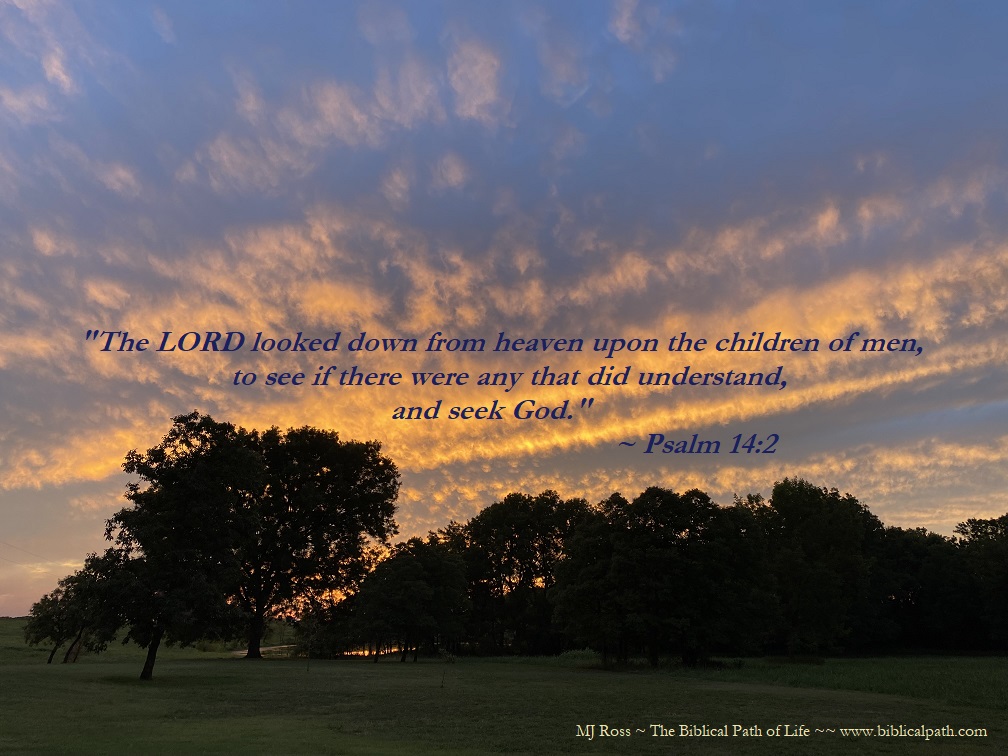
“The LORD looked down from heaven upon the children of men, to see if there were any that did understand, and seek God.”
Psalm 14:2
In the life of King Hezekiah, we can read of a hope for someone whose family does not know of God or the things of God. Remember, King Hezekiah was the son of a terrible king of Judah. King Ahaz had not only forsaken God, but also worshiped idols – even sacrificing a son to the false god Molech. He replaced the worship of God with idolatry, and then finally “… and shut up the doors of the house of the LORD …” (2 Chronicles 28:24b); “… and provoked to anger the LORD God of his fathers” (2 Chronicles 28:25b). In spite of all of that, Hezekiah knew God and pleased Him in all that he did. “And he did that which was right in the sight of the LORD, according to all that David his father had done” (2 Chronicles 29:2). Hezekiah was twenty-five years old when he became king and reigned for twenty-nine years. “He trusted in the LORD God of Israel; so that after him was none like him among all the kings of Judah, nor any that were before him” (2 Kings 18:5).
How was Hezekiah able to come to know God, knowing the family into which he was born? Read the following encouraging verse: “But if from thence thou shalt seek the LORD thy God, thou shalt find him, if thou seek him with all thy heart and with all thy soul” (Deuteronomy 4:29). One has to seek God.
We can read many of the things that Hezekiah did as king of Judah revealing the process to seek and find God. We can recognize that King Hezekiah took the time to seek God’s Word so he would know what God required to reestablish the relationship that had been severed by the previous bad kings. See where King Hezekiah began. In the first month of the first year of King Hezekiah’s reign, he “opened the doors of the house of the LORD, and repaired them” (2 Chronicles 29:3). His kingship began the right way. He then called the Levites together. “And said unto them, Hear me, ye Levites, sanctify now yourselves, and sanctify the house of the LORD God of your fathers, and carry forth the filthiness out of the holy place” (2 Chronicles 29:5). They had to begin by cleaning themselves, and then the house of the Lord (the Temple).
King Hezekiah acknowledged something very important. “For our fathers have trespassed, and done that which was evil in the eyes of the LORD our God, and have forsaken him, and have turned away their faces from the habitation of the LORD, and turned their backs” (2 Chronicles 29:6). He recognized that the people had turned away from God, doing evil. Not only did he recognize the sin of the nation, Judah, but he also recognized God’s chastisement upon His people (see 2 Chronicles 29:8-9). What was in King Hezekiah’s heart? “Now it is in mine heart to make a covenant with the LORD God of Israel, that his fierce wrath may turn away from us” (2 Chronicles 29:10). Hezekiah had to have his heart right before God.
Hezekiah then gave direction to the Levites. After declaring what needed to be done, the work began. The Temple was cleansed (2 Chronicles 29:11-19). They restored the service in the Temple and the relationship with God. “And when they had made an end of offering, the king and all that were present with him bowed themselves, and worshipped” (2 Chronicles 29:29). When it was done God’s way, the people could worship God. After this, King Hezekiah sent letters to all of Judah, calling them to keep the Passover. Hezekiah led the people by example when he brought great offerings into the house of the Lord (see 2 Chronicles 30).
Once they reestablished the service to the Lord, and the relationship was restored, they had work to do. They removed all of those high places where King Hezekiah’s father worshiped and even broke down all of those images the people worshiped. “Now when all this was finished, all Israel that were present went out to the cities of Judah, and brake the images in pieces, and cut down the groves, and threw down the high places and the altars out of all Judah and Benjamin, in Ephraim also and Manasseh, until they had utterly destroyed them all…” (2 Chronicles 31:1). They had to eliminate. The period of King Hezekiah’s reign has been called the greatest revival Judah experienced.
Read what God did for Hezekiah for seeking Him with all of his heart. “And in every work that he began in the service of the house of God, and in the law, and in the commandments, to seek his God, he did it with all his heart, and prospered” (2 Chronicles 31:21). God made King Hezekiah to prosper.
Who does not seek after God? “The wicked, through the pride of his countenance, will not seek after God: God is not in all his thoughts” (Psalm 10:4).
What should we do? “O God, thou art my God; early will I seek thee: my soul thirsteth for thee, my flesh longeth for thee in a dry and thirsty land, where no water is” (Psalm 63:1).
Also read the following: “The LORD looked down from heaven upon the children of men, to see if there were any that did understand, and seek God” (Psalm 14:2). God knows when someone seeks after Him, for He is watching and waiting! Just as King Hezekiah sought God early, we should, too. “I love them that love me; and those that seek me early shall find me” (Proverbs 8:17).
Have you sought God, desiring your heart to be right before Him, cleaning your life and eliminating all things contrary to God?




